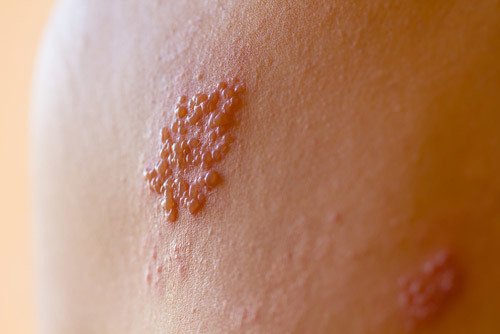Zostavax reduces the risk that people will develop shingles by 51percent – for appropriate patients aged 60 years or over.
Efficacy of the medicine goes down as the age of a person goes up. For example, clinical studies have shown that the drug reduces the risk that people will get shingles by:
- 70 percent for patients aged 50-59 years,
- 64 percent for patients 60-69 years,
- 41percent for patients 70-79 years, and
- 18 percent for patients 80 years of age or older.
Studies have also shown that the efficacy of the medicine decreases over time. Protection against shingles decreases to 35 percent six years after vaccination.
Zostavax use began in the United Kingdom (“UK”) in 2013 to help patients aged 70 years old avoid shingles. A three-year study found that the drug was 64 percent effective in helping persons steer clear of the sickness.
Zostavax is a live virus. This means it works by injecting a live (although weakened) form of the zoster virus into a person’s body.
Shingrix is another vaccine that is aimed to prevent a person from contracting shingles. The Centers for Disease Control and Prevention (“CDC”) states that Shingrix is the preferred drug over Zostavax.
According to CDC:
- two doses of Shingrix is more than 90% effective at preventing shingles, and
- protection stays above 85% for at least the first four years after a patient gets vaccinated.
People taking the Zostavax medication have reported experiencing some of the following complications and side effects:
- shingles (or, the virus that Zostavax was meant to prevent),
- rash,
- hives,
- fever,
- nausea,
- headache, and
- joint and muscle pain.
In addition, thousands of Zostavax lawsuits have been filed against the drug’s manufacturer Merck & Co Inc. Pharmaceuticals since 2016. The plaintiffs in these lawsuits allege that, in addition to the above complications, the medication causes:
- neurological diseases or disorders, like brain inflammation (or encephalitis) and brain damage,
- spinal cord inflammation (or myelitis),
- hearing loss,
- blindness,
- liver damage and liver failure, and
- neuropathy.
Our national mass tort lawsuit attorneys will highlight the following in this article:
- 1. What is the efficacy of Zostavax for persons aged 50 to 59 years?
- 2. What is the efficacy of Zostavax for persons aged 60 years and older?
- 3. What is the efficacy of Zostavax for persons under the age of 50?
- 4. What is the duration of Zostavax efficacy?
- 5. Is there Zostavax efficacy information for any countries outside of the United States?
- 6. How does Zostavax work?
- 7. Do any other vaccines help prevent shingles?
- 8. Is Zostavax still being used?
- 9. Are there any complications associated with Zostavax?

1. What is the efficacy of Zostavax for persons aged 50 to 59 years?
Zostavax reduces the risk that people will develop shingles by 70 percent – for appropriate patients aged 50 to 59 years old.1
The above percentage was found via the Zostavax Efficacy and Safety Trial (“ZEST”). During this trial, 22,439 persons aged 50 to 59 were randomized to receive a single dose of either Zostavax or placebo.2 Placebo is a control in testing new drugs and is a substance that has no therapeutic effect.
In the Zest trial, a total of 11,2111 patients received Zostavax and 11,228 received placebo. The patients were monitored for approximately a year and a half after the medicine/placebo was given.
2. What is the efficacy of Zostavax for persons aged 60 years and older?
Zostavax reduces the risk that people will develop shingles by 51 percent – for appropriate patients aged 60 years and older.3
Efficacy of the medicine goes down as the age of a person goes up. This was found during both ZEST and the Shingles Prevention Study (“SPS”). For example, the studies have shown that the drug reduces the risk that people will get shingles by:
- 70 percent for patients aged 50-59 years,
- 64 percent for patients 60-69 years,
- 41percent for patients 70-79 years, and
- 18 percent for patients 80 years of age or older.4
The SPS assessed efficacy of Zostavax in 38,546 people aged 60 years old or over. These people were randomized to receive a single dose of either Zostavax or placebo. In total, 19,270 parties received Zostavax and 19,276 persons received placebo.5
Randomization in the study was done by age group (60 to 69 years of age and 70 years old and over). All patients in the SPS were monitored for approximately three to four years after the medicine/placebo was given.6
3. What is the efficacy of Zostavax for persons under the age of 50?
The recommended and minimum age for Zostavax is 50 years. This means there is no efficacy data for persons under the age of 50.
Please note that if a dose of Zostavax is given to a person under the age of 50, no adverse effect should take place. Further, it is recommended that a second dose not be given until the patient is over 50.
4. What is the duration of Zostavax efficacy?
Studies have shown that the efficacy of the medicine decreases over time. Protection against shingles decreases to 35 percent six years after vaccination.7
The CDC and the Marshfield Clinic Research Institute (“MCRI”) conducted a 12-year review of Zostavax studies and clinical trials. In particular, the team searched various databases for studies evaluating the vaccine’s effectiveness for patients 60 years old or over. A total of 1,302 studies were analyzed.8
CDC and MCRI efforts revealed that, within four years of Zostavax vaccination, the drug’s effectiveness reduced by between 19 to 40 percent.9
According to the Immunization Action Coalition, shingle protection decreases to 35 percent six years after Zostavax is given.10
5. Is there Zostavax efficacy information for ay countries outside of the United States?
One recent study in the UK has provided efficacy information for Zostavax users aged 70 years old. This three-year study shows that the drug is 64 percent effective in helping 70-year-old patients avoid getting shingles.11
Zostavax use began in the UK in 2013.12 The study included 516,547 people. Twenty-one percent of them were vaccinated with Zostavax. The study only examined patients 70 years of age. No other age groups were analyzed.13
6. How does Zostavax work?
Zostavax is a live virus. Administration of Zostavax works by injecting a live (although weakened) form of the zoster virus into a person’s body.14 The zoster virus is the virus that causes shingles.
Once injected, the body fights off the virus. This “fight” increases the immune system’s opposition to the zoster virus.15
As a result, the immune system becomes heightened, and in theory, is better able to fight a real zoster virus, or case of shingles.
Please note that there is a difficulty with the fact that Zostavax is a live virus. This is that the immune system of many people that take the vaccine is weak and cannot even fight off the live virus. This means that these people run the risk of contracting other viruses, like chickenpox and even shingles.16

7. Do any other vaccines help prevent shingles?
As mentioned above, Shingrix is another vaccine that is aimed to prevent a person from experiencing shingles. The vaccine uses a recombinant design as opposed to a live design.
The CDC states that Shingrix is the preferred drug over Zostavax. CDC recommends that healthy adults 50 years and older should get two doses of Shingrix, separated by 2 to 6 months, to best fight off the Shingles illness.17
According to CDC:
- two doses of Shingrix is more than 90 percent effective at preventing shingles, and
- protection stays above 85 percent for at least the first four years after a patient gets vaccinated.18
In one trial that involved more than 15,000 patients (aged 50 or older), Shingrix’s efficacy for preventing Shingles was greater than 95 percent.19 In a companion trial that included almost 14,000 patients (aged 70 or older), efficacy was about 90 percent.20
8. Is Zostavax still being used?
Shingrix is now the “preferred” drug over Zostavax. This does not mean, however, that Zostavax is no longer used to help prevent shingles. The medicine may still be given to adults aged 60 years old or over in certain cases.21
Examples of when Zostavax may still be used include:
- when Shingrix is not available,
- a patient prefers it over other medicines, and/or
- a patient is allergic to Shingrix.22
9. Are there any complications associated with Zostavax?
People Zostavax medication have reported experiencing some of the following complications and side effects:
- shingles (or, the virus that Zostavax was meant to prevent),
- rash,
- hives,
- fever,
- nausea,
- headache, and
- joint and muscle pain.23
In addition, thousands of lawsuits have been filed against the Zostavax manufacturer Merck Merck. Pharmaceuticals since 2016. The plaintiffs in these lawsuits allege that, in addition to the above complications, the medication causes:
- neurological diseases or disorders, like brain inflammation (or encephalitis) and brain damage,
- spinal cord inflammation (or myelitis),
- hearing loss,
- blindness,
- liver damage and liver failure, and
- neuropathy.
Zostavax may also cause immunocompromised patients to develop shingles.
The medicine is not recommended for people under the age of 50. In addition, the drug is not recommended for the following two categories of people:
- persons who have experienced a life-threatening reaction to gelatin, neomycin, or any other component of shingles vaccine, and
- persons with a weakened immune system due to certain conditions.
Did you experience an injury or adverse condition after taking Zostavax? Call us for help…

If you or someone you know has experienced an injury or adverse effect upon taking the Zostavax vaccine, we invite you to contact us for a free consultation. We can be reached 24/7.
Legal References:
- “ZOSTAVAX Efficacy and Safety Trial (ZEST),” MerkVaccines.com.
- See same.
- “Shingles Prevention Study (SPS),” MerkVaccines.com.
- See same.
- See same.
- See same.
- “Zoster (Shingles),” Immunize.org.
- “Zostavax Vaccine Efficacy: A 12-Year Review,” MPR website.
- See same.
- “Zoster (Shingles),” Immunize.org.
- “Effectiveness of herpes zoster vaccination in an older United Kingdom population,” National Center for Biotechnology Information (NCBI) website.
- See same.
- See same.
- U.S. Department of Health and Human Services, “Vaccine Types.” www.vacines.gov.
- See same.
- Centers for Disease Control and Prevention (CDC), “What Everyone Should Know about Zostavax.” CDC website.
- Centers for Disease Control and Prevention (CDC), “What Everyone Should Know about Shingrix.” CDC website.
- See same.
- Abigail Zuger, MD, “New Shingles Vaccine is Here!” New England Journal of Medicine.
- See same.
- “Zoster (Shingles),” Immunize.org.
- See same.
- U.S. Food and Drug Administration, “Zostavax.” FDA website.
